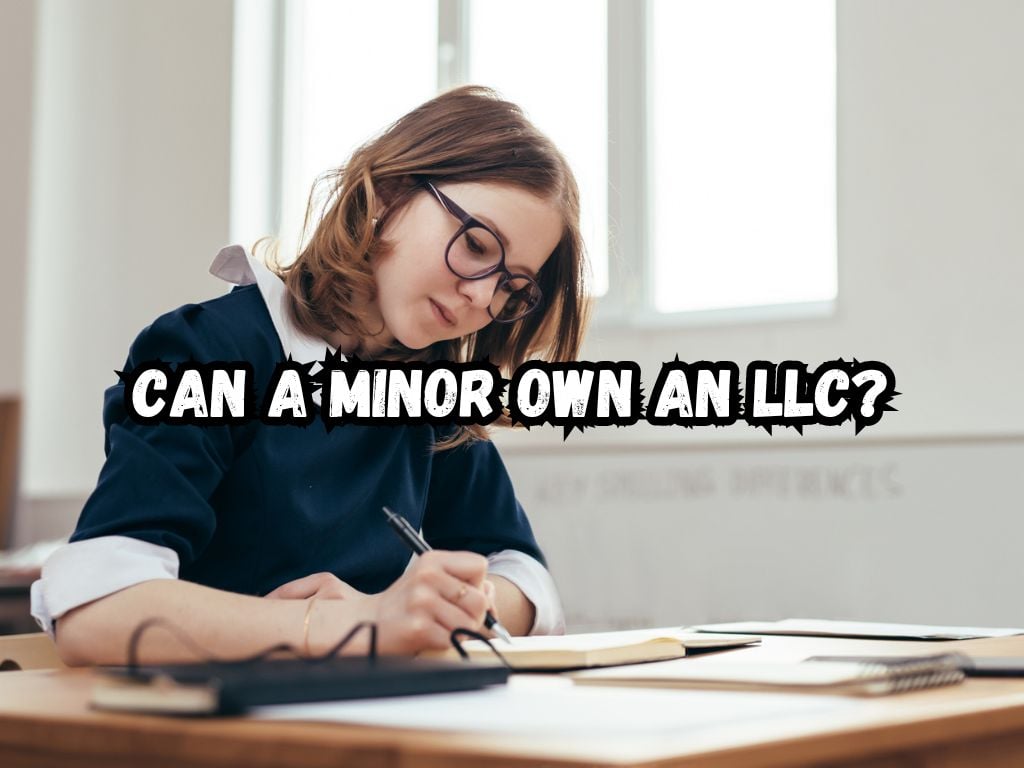Starting a Limited Liability Company (LLC) often seems like a domain reserved for adults. However, the question arises: Can a minor own an LLC?
The concept may sound outlandish to some, but it’s certainly not unheard of. Young entrepreneurs are sprouting in every direction, with creative minds yearning to establish a foothold in the business world.
Can a Minor Own an LLC?
The law doesn’t often delve deep into the gray areas surrounding minors owning businesses. Generally, it varies state by state. In some regions, there’s no explicit legal language barring minors from owning an LLC.
But that doesn’t explicitly mean it is allowed either. Restrictions may exist, not on ownership per se but rather on elements tied to running a business. For instance, in most places, underaged individuals can’t sign legally binding contracts.
However, there are undoubtedly legal exceptions and precedents of minor-owned LLCs. For instance, “Ben Pasternak, a teen from Australia, formed a tech-company LLC in Delaware, USA,” is a piece of information you may find intriguing.
This kind of entrepreneurship by minors, while not typical, indeed challenges common perceptions.

How to Form an LLC as a Minor
Starting an LLC as a minor has a unique process. While the steps are similar to the standard procedure, there are key differentiations. One typical step is having an adult play an active role in the company as a legal safeguard.
That safeguard can range from a minor’s parent or guardian serving as the official organizer when filing to form the LLC or having an adult as a member of the LLC.
It’s also essential to keep in mind that these processes may oscillate across jurisdictions. For instance, state-specific rules in Texas might differ from the regulations practised in California.
Hence, research becomes imperative. Detailed legal consultation before venturing into such an ambitious path is imperative, so essential details don’t fall through the cracks.
Challenges Faced by Minor-Owned LLCs
A minor owning an LLC is no easy feat. Legal contract limitations pose significant hurdles since minors typically can’t execute binding contracts. That’s a fundamental business necessity. Hence, the presence of an adult becomes an unavoidable requirement to maneuver these challenges.
Other hindrances may include banking and loan acquisition. Without the authority to open bank accounts or the capacity to access loans as readily as an adult, routine business operations might become tough to conduct.
However, none of these challenges are insurmountable. With ample preparation, minors can find ways to fit the business puzzle pieces together.
Success Stories of Minor-Owned Businesses
Stories of successful minor-owned businesses are not scarce. They serve as proof of the unprecedented potential that minor entrepreneurs harbor.
Farhad Monshipour is an ordinary teenager, but his business, Awesome Bites Co., is extraordinary. He started his allergen-free bakery as an LLC in Texas, proving that age isn’t a barrier to entrepreneurship largesse.
Take another example from New York. Noa Mintz started Nannies by Noa, a full-service childcare agency when she was just 15. Her booming success is a testament to the fact that minors can, in fact, navigate the LLC landscape with finesse.
Legality and Regulations of Minor-Owned LLCs
In general, the legal system does not expressly prohibit minors from owning an LLC. However, minor-owned LLCs encounter unique legal complications chiefly due to minors’ legal incapability to enter into contracts, an integral part of business operations.
The specific laws and regulations vary significantly by state jurisdiction. For instance, in some states, such as Delaware, there are minimal age-related restrictions, thus favoring minor entrepreneurs.
Contrarily, states like California pose a more rigid stance, complicating the process. Therefore, potential minor business owners often resort to adult guardianship or partnership to help navigate these complexities. It’s crucial to consult an attorney in your specific state for the most accurate guidance.

Benefits and Drawbacks of Minor-Owned LLCs
Benefits:
- Early Business Experience: Starting an LLC at a young age fosters entrepreneurship skills, creativity, and responsibility.
- Advantage of Time: Young entrepreneurs often have fewer life responsibilities, allowing more time and energy to invest in their business.
- Educational Growth: Running a business can complement formal education, providing practical insight into economics, management, and discipline.
Drawbacks:
- Legal Limitations: Minors face restrictions in signing contracts and other legal hurdles, complicating business operations.
- Financial Challenges: Limited access to credit and funding obstructs business growth, requiring dependable adult cosigners.
- Balancing Act: Juggling business responsibilities with schoolwork and personal growth can be stressful, potentially impacting education and well-being.
Frequently Asked Questions
Can a minor be a member of an LLC?
There’s no definitive answer, and it may fluctuate depending upon the law of the state. It’s best to check with a legal advisor.
What are the restrictions on minors starting and running an LLC?
Typically, restrictions revolve around contractual limitations, banking rules, and challenges in obtaining loans without an adult.
These frequently asked questions offer insights into common queries about minor-owned LLCs. The best advice for young entrepreneurs is to gain comprehensive insight into the legalities involved before stepping into the venture.
Conclusion
Minor-owned LLCs aren’t as offbeat as they might initially appear. They’re bursts of ingenuity, leading young minds to uncharted territories.
Remember, though, that understanding the legal requirements and implications is crucial before considering such a venture. The hack is not to deter but to act armed with complete information.


 Tags:
Tags:










